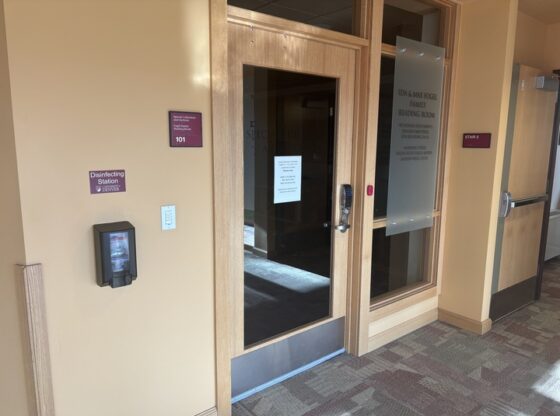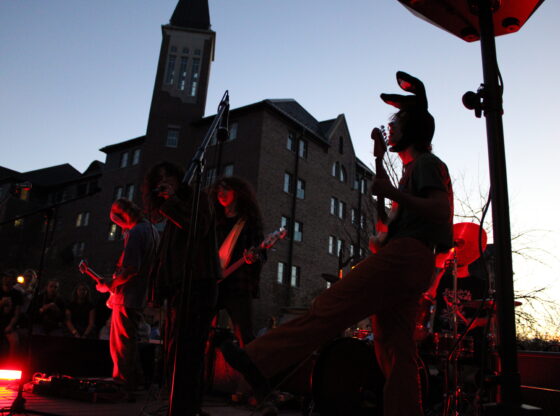Marijuana has long been associated with college campuses nationwide but never part of the curriculum. Universities are now offering classes ranging from the medical applications of cannabis at Northern Michigan University to the schematics of defending a client with a marijuana-related charge at DU’s own Sturm College of Law. The drug that long carried a heavy social stigma is also now being discussed on presidential debate stages alongside other common issues. Many colleges provide courses related to cannabis in an effort to help their students find a foothold in the growing market for marijuana.
The world of legal marijuana cultivation isn’t what many might expect. The weed isn’t grown in basements or dingy back-rooms—marijuana is heavily regulated, with the growth and sale held to the highest standards. For Lilach Major Power, CEO of medicinal cannabis company “The Giving Tree,” competent and passionate employees are a necessity: “For cultivation, I look for students with a degree related to agriculture… For extraction, I will look for someone with a chemistry or biology degree and background. For inventory, I look for MBA and supply management degrees and so on.”

The long-standing taboo surrounding study marijuana as well as processing it is a major advantage for those entering the industry. Demand for qualified chemists, biologists and horticulturalists continues to rise. Offering courses in these fields centered around cannabis will prove beneficial for both colleges and students. Universities willing to risk controversy to provide courses in marijuana studies can capitalize on the rarity of schools doing so while students will receive a valuable education in a field that continues to grow.
But the demand for more qualified marijuana specialists isn’t purely market-driven. Medicinal cannabis has emerged as a viable solution to a lieu of medical issues that have long evaded treatment. Cancer, Alzheimer’s disease and mental health disorders are often treated with opioids, fueling the United States painkiller addiction. 130 Americans die every day from opioid overdoses, a number that continues to grow every year. The prevalence of opioids such as fentanyl and oxycodone is a result of aggressive marketing from the pharmaceutical industry under lenient government regulation. America is in the grip of the opioid epidemic, and medicinal marijuana hopes to be the light at the end of the tunnel. Demand for medical professionals in this field grows from year to year with the possibilities for medical marijuana promising an ever-expanding field.
Colorado has always been at the forefront of cannabis change, and its scholars are no different. The Colorado State University of Pueblo recently announced that it would introduce a two-part marijuana study program. The course focuses on the science behind cannabis and its potential applications. CSU-Pueblo chooses a holistic and pragmatic approach when dealing with marijuana, with Dean Lehmpuhl affirming, “We’re not pro-cannabis or anti-cannabis. What we’re about will be the science and training students to look at that science.”
While CSU-Pueblo may be the first college to offer a degree based on Marijuana, DU blazed the way with its law courses tailored to deal with the legalization of cannabis. The course offered at DU’s own Sturm College of Law promises to “provide students with an understanding of the realities of representing a marijuana client (either private or public) in the current turbulent legal environment.” Introducing classes both relevant and interesting to prospective and current students attracts attention to the university and provides DU students with skills applicable to a changing economy. Cannabis Journalism is also offered at the University of Denver, and enables students to discuss the rapidly-evolving world of marijuana through their writing and investigations. Misinformation in this emerging market is all too common, and the need for journalists able to capably describe the condition of marijuana on both the state and national level is greater than ever. In order to give students real-world experience, the curriculum includes opportunities for “Students [to] visit and interview dispensaries, industry professionals and private citizens to produce a portfolio piece of narrative journalism”. Through these efforts, local Universities are preparing their students for the difficulties and potential benefits in the market for cannabis.

While many have been quick to praise universities adopting cannabis-oriented programs, the benefits of the move remain hazy. The lack of uniform regulation of cannabis, as well as the heated debate concerning its legalization, limits the scope of marijuana programs and their graduates. Many hope that time will bring greater freedoms concerning cannabis, but, in many areas, the nation is as divided as ever.
Administrators across the board stress that potential students must enter these programs with the right mindset. Courses in marijuana aren’t what many first imagine—these programs require hard work and advanced knowledge of both chemistry and biology. Classes in law require trainees to adapt to the ever-shifting regulation of marijuana, as the control of cannabis now may not hold true in as little as five years.
However, for many, a career in cannabis is a wise move. The field only continues to grow, with the national controversy only fueling its popularity. Society has discussed marijuana in hushed tones for far too long—it doesn’t have to be that way. Many colleges nationwide, including our own, are working to create more well-informed citizens ready to facilitate the integration of marijuana into medicine and law. With change steadily sweeping across America, DU is at the forefront.











